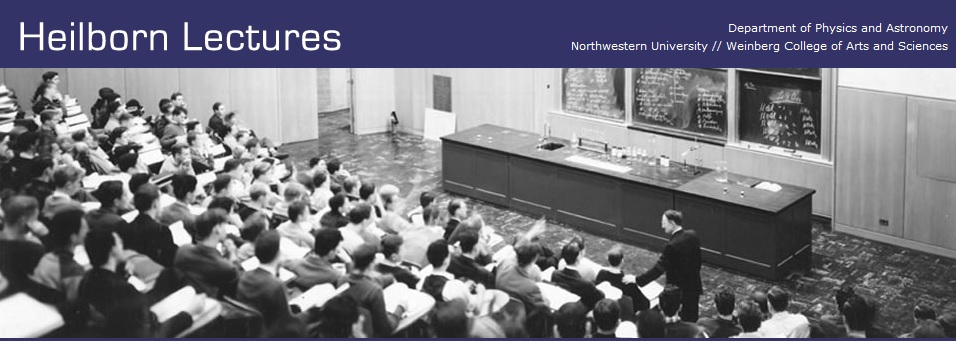
About The Heilborn Lectures
The Department of Physics and Astronomy thanks George Heilborn (1935-2015), a graduate of Northwestern's physics program, for his generous support of the Heilborn Lectures at Northwestern University. We have benefited greatly from this program over the years. George Heilborn created this endowment in the memory of his parents, Walter and Christine Heilborn, in 2000 in order to strengthen the Physics & Astronomy program at Northwestern for the benefit of faculty, students, and other departments in the Chicago area.
For information about the next Heilborn Lecture series, click here.
Past lectures
2025 |
Alain Aspect, Recipient of the 2022 Nobel Prize in Physics; Professor at the Institut d'Optique - Université Paris-Saclay (Augustin Fresnel Chair); Professor at the École Polytechnique - Institut Polytechnique de Paris; Emeritus Senior Researcher at the CNRS, The French National Centre for Scientific Research; Member of the Académie des Sciences |
From Einstein’s Doubts to Quantum Technologies: Non-Locality in Action |
2024 |
Marcia J. Rieke, Principal investigator for the near-infrared camera (NIRCam) on the James Webb Space Telescope, Regents' Professor of Astronomy at the University of Arizona, Elizabeth Roemer Chair in the Steward Observatory |
Gratification from Building and Testing JWST: A Potpourri of First Results The Search for the Most Distant Galaxies James Webb Space Telescope: 25 Years to Build, 2 Years to Change Astronomy |
2022 |
William D. Phillips, Nobel Laureate; Distinguished University Professor & College Park Professor, University of Maryland; Physicist, National Institute of Standards and Technology (NIST) |
A New Measure: The revolutionary, Quantum Reform of the Modern Metric System |
2019 |
Rainer Weiss, Professor of Physics (Emeritus) Massachusetts Institute of Technology. Nobel Prize for Physics, 2017. |
Gravitational waves: astrophysics, technical challenges and prospects for the future The Gamble taken by the NSF with LIGO |
2018
|
Sir Michael Berry, Melville Wills Professor of Physics (Emeritus). HH Wills Physics Laboratory, University of Bristol, UK. |
Nature’s optics and our understanding of light Variations on a theme of Aharonov and Bohm Faster than Fourier: superoscillations, weak measurement, vorticulture... Chasing the dragon: tidal bores in the UK and elsewhere; quantum and Hawking radiation analogies How quantum physics democratized music: a meditation on physics and technology |
October 2016 |
Andrea Ghez, Professor of Physics & Astronomy and Laruen B. Leichtman & Arthur E. Levine Chair in Astrophysics. University of California, Los Angeles. |
Unveiling the Supermassive Black Hole at the Center of Our Galaxy Our Galatic Center: A Laboratory for Exploring the Physics & Astrophysics of Black Holes |
April 2016 |
David Wineland. National Institute of Standards and Technology and The University of Colorado. |
|
2015 |
Kostya Novoselov, Langworthy Professor of Physics. University of Manchester, UK. |
Twist-controlled electronic properties of van der Waals Heterostructures. |
2014 |
Adam Riess, Thomas J. Barber Professor of Astronomy and Physics. Johns Hopkins University. |
|
2013 |
Carlo Rubbia, Professor, Harvard University, 1970-1988. Director General, CERN, 1989-1994. |
Neutrinos: A Golden Field for Astroparticle Physics Non-Liouvillian cooling in particle accelerators: from proton-antiproton colliders to a Higgs factory The Future of Energy |
2012 |
Kimitoshi Kono, Chief Scientist. Low Temperature Physics Laboratory, RIKEN, Japan. |
History and Single Electron Transport on Liquid Helium Strong Microwave Excitation and Negative Resistance States Experiments on Superfluid 3He |
2011 |
John Ellis, CERN, Division Leader 1988-94, Clerke Maxwell Professor of Theoretical Physics. Kings College, London. Yannis Semertzidis, Physicist, Brookhaven National Laboratory. Laurence Littenberg, Physicist, Brookhaven National Laboratory. Paris Sphicas, Senior Staff Physicist, CERN. University of Athens. |
|
2010 |
Murray Gell-Mann, Professor Emeritus, Caltech. Distinguished Fellow, Santa Fe Institute. Jacques Lasker, Director of Research CNRS. Paris Observatory. James Yorke, Professor of Mathematics and Physics, University of Maryland. Yoram Lithwick, Assistant Professor, Northwestern University. James Sauls, Professor, Northwestern University. Michael Syphers, Assistant Accelerator Division Head, Fermi National Accelerator Laboratory. |
|
2009 |
Leon Lederman, Director Emeritus, Fermi National Accelerator Laboratory, Pritzker Professor of Physics, Illinois Institute of Technology. |
Galilleo and the LHC How to Violate Symmetry in 39 Hours Science Education and the Education of Scientists |
2008 |
Steven Chu, Professor of Physics and Molecular & Cell Biology, William R. Kenan, Jr. Professor of Humanities & Sciences, Stanford University. United States Secretary of Energy, 2009-2013. Director, Lawrence Berkeley National Laboatory, 2004-2009. |
The World's Energy Problem and What We Can Do About It Coherent Control of Ultra-Cold Matter |
2007 |
Alan Guth, Victor F. Weisskopf Professor of Physics, Massachusetts Institute of Technology. |
Cosmic Inflation and the Accelerating Universe The Basic Physics of Inflationary Cosmology Eternal Inflation and the String Theory Landscape |
2006 |
David Gross, Frederic W. Gluck Professor of Theoretical Physics. Director, Kavli Institute for Theoretical Physics, University of California, Santa Barbara. |
The Theory of Elmentary Particles Questions and Speculations The Coming Revolutions |
2005 |
Barry Barish, Ronald and Maxine Linde Professor of Physics, Caltech. Director, LIGO Laboratory. |
Probing Einstein's Universe The Next Great Particle Accelerator: The International Linear Collider Detecting Gravitational Waves with LIGO |
2004 |
Frank Wilczek, Hermann Feshbach Professor of Physics, Massachusetts Institute of Technology. |
The Origin of Mass and the Feebleness of Gravity Exotic Superfluidities /diquarks and Pentaquarks |
2003 |
Philip Anderson, Professor, Princeton University. |
RVB, Plain Vanilla More is Different
|
2002 |
Theodore Haensch, Director, Max-Planck-Institut fur Quantenoptik, Garching. Professor of Physics, Ludwig-Maximilians-Universitat, Munchen, Germany. |
|
2001 |
James Bjorken, Professor of Physics, Stanford University. Director, Stanford Linear Accelerator (SLAC). |
